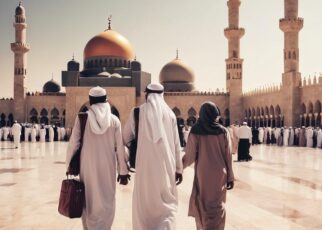Traveling to places where Ramadan happens can be a special experience, giving travelers a chance to learn more about the culture and beliefs of countries where Muslims are the majority. Ramadan is the ninth month of the Islamic calendar, and it’s a big deal for Muslims everywhere. They fast, pray, and take time for self-reflection during this time. If you’re thinking of traveling during Ramadan, here’s a simple guide to help you understand the customs and traditions you might encounter.
Understanding Ramadan
Ramadan is a time when Muslims focus on spiritual growth and self-discipline. Fasting from dawn until sunset is one of the five pillars of Islam, obligating practicing Muslims to abstain from food, drink, smoking, and other vices during daylight hours. The month is also marked by increased acts of charity, prayer, and reading the Quran, the holy book of Islam.
Traveling During Ramadan
Before embarking on your journey, it’s essential to determine if your travels coincide with Ramadan. Since the dates of Ramadan shift each year according to the lunar calendar, a quick online search can help you identify the month of Ramadan for your desired travel period. While travelers are not expected to fast, it’s crucial to respect local customs and laws regarding public eating and smoking.
Adapting to Local Customs
During Ramadan, you’ll notice changes in daily routines and business hours. Restaurants may only open for takeaway orders during the day, with dine-in options available after sunset. Similarly, tourist sites and markets may adjust their operating hours to accommodate the fasting period. Being aware of these changes and planning your activities accordingly can enhance your travel experience.
Also Read: How to Make Your Android Battery Last Longer
Cultural Sensitivity
Cultural sensitivity is paramount when traveling during Ramadan. Refraining from eating, drinking, and smoking in public spaces demonstrates respect for those observing the fast. Dressing modestly and avoiding public displays of affection are also essential aspects of cultural etiquette during this time. Greeting locals with phrases like “Ramadan Mubarak” or “Ramadan Kareem” further showcases your understanding and appreciation of the significance of the month.
Also Read: Navigating Cost-of-Living Crisis with Confidence
Experiencing Ramadan Like a Local
For travelers seeking a more immersive experience, participating in local iftars (the evening meal to break the fast) can provide unique insights into Ramadan traditions. Many communities host collective iftars, where neighbors and visitors come together to share a meal and celebrate the spirit of generosity and community. Joining in these communal gatherings allows travelers to connect with locals and experience the hospitality and warmth of Ramadan firsthand.
Discover more from Thenewsdoor
Subscribe to get the latest posts sent to your email.





